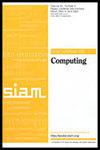Online Primal Dual Meets Online Matching with Stochastic Rewards: Configuration LP to the Rescue
IF 1.6
3区 计算机科学
Q3 COMPUTER SCIENCE, THEORY & METHODS
引用次数: 0
Abstract
SIAM Journal on Computing, Volume 53, Issue 5, Page 1217-1256, October 2024.Abstract. Mehta and Panigrahi (FOCS 2012, IEEE, Piscataway, NJ, 2012, pp. 728–737) introduce the problem of online matching with stochastic rewards, where edges are associated with success probabilities and a match succeeds with the probability of the corresponding edge. It is one of the few online matching problems that have defied the randomized online primal dual framework by Devanur, Jain, and Kleinberg (SODA 2013, SIAM, Philadelphia, 2013, pp. 101–107) thus far. This paper unlocks the power of randomized online primal dual in online matching with stochastic rewards by employing the configuration linear program rather than the standard matching linear program used in previous works. Our main result is a 0.572 competitive algorithm for the case of vanishing and unequal probabilities, improving the best previous bound of 0.534 by Mehta, Waggoner, and Zadimoghaddam (SODA 2015, SIAM, Philadelphia, 2015, pp. 1388–1404) and, in fact, is even better than the best previous bound of 0.567 by Mehta and Panigrahi (FOCS 2012, IEEE, Piscataway, NJ, 2012, pp. 728–737) for the more restricted case of vanishing and equal probabilities. For vanishing and equal probabilities, we get a better competitive ratio of 0.576. Our results further generalize to the vertex-weighted case due to the intrinsic robustness of the randomized online primal dual analysis.
带有随机奖励的在线原始二重匹配:配置 LP 的拯救
SIAM 计算期刊》,第 53 卷第 5 期,第 1217-1256 页,2024 年 10 月。 摘要。Mehta 和 Panigrahi (FOCS 2012, IEEE, Piscataway, NJ, 2012, pp. 728-737)介绍了随机奖励在线匹配问题,其中边与成功概率相关联,匹配成功与相应边的概率有关。它是迄今为止少数几个能打败 Devanur、Jain 和 Kleinberg(SODA 2013,SIAM,费城,2013 年,第 101-107 页)提出的随机在线原始对偶框架的在线匹配问题之一。本文通过使用配置线性程序,而不是之前工作中使用的标准匹配线性程序,释放了随机在线原始对偶在随机奖励在线匹配中的威力。我们的主要结果是在概率消失和不相等的情况下实现了 0.572 的竞争性算法,改进了 Mehta、Waggoner 和 Zadimoghaddam 以前的最佳约束 0.534(SODA 2015,SIAM,费城,2015 年,第 1388-1404 页),并且,在这种情况下,我们的主要结果是在概率消失和不相等的情况下实现了 0.572 的竞争性算法。1388-1404),事实上,在概率消失和概率相等的更受限制的情况下,它甚至优于 Mehta 和 Panigrahi 以前的最佳约束 0.567(FOCS 2012,IEEE,Piscataway,NJ,2012,第 728-737 页)。在概率消失和概率相等的情况下,我们得到了更好的竞争比 0.576。由于随机在线原始对偶分析的内在鲁棒性,我们的结果进一步推广到顶点加权情况。
本文章由计算机程序翻译,如有差异,请以英文原文为准。
求助全文
约1分钟内获得全文
求助全文
来源期刊

SIAM Journal on Computing
工程技术-计算机:理论方法
CiteScore
4.60
自引率
0.00%
发文量
68
审稿时长
6-12 weeks
期刊介绍:
The SIAM Journal on Computing aims to provide coverage of the most significant work going on in the mathematical and formal aspects of computer science and nonnumerical computing. Submissions must be clearly written and make a significant technical contribution. Topics include but are not limited to analysis and design of algorithms, algorithmic game theory, data structures, computational complexity, computational algebra, computational aspects of combinatorics and graph theory, computational biology, computational geometry, computational robotics, the mathematical aspects of programming languages, artificial intelligence, computational learning, databases, information retrieval, cryptography, networks, distributed computing, parallel algorithms, and computer architecture.
 求助内容:
求助内容: 应助结果提醒方式:
应助结果提醒方式:


